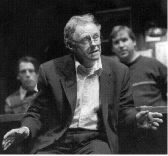IRISH FOLKLORE SAYS the souls of the dead can’t cross water. Maybe that’s why The Weir seems so spiritless in Seattle. But maybe not.
Conor McPherson’s intermission-less melodrama, set in a lonely pub on the far northwest coast of Ireland, won rave reviews and a Best Play award when it premiered in London in 1998. But despite the best efforts of Intiman’s design team to generate a little nameless dread (creaking doors, moaning wind, flickering lights), the atmosphere remains stubbornly prosaic—little drama, and hardly any melo- at all.
The Weir
Intiman Theater, ends October 14
McPherson, a 29-year-old ex-philosophy tutor at University College Dublin, has an intriguing idea for a play here: What he does not appear to have is the craft to turn his idea to theatrical account. Next to the flashy, efficient dramatic vehicles run up by McPherson’s contemporary and countryman Martin McDonagh (The Beauty Queen of Leenane, A Skull in Connemara), The Weir barely rates comparison with a wheelbarrow, and one with a flat tire at that.
So far as I can make out from dim hints here and there, McPherson wants to show us Ireland on a spiritual cusp: After centuries of being typecast as the feckless poet-dreamers of Western civilization, the Irish today find themselves in the vanguard of the new Europe and not entirely comfortable about trading in nostalgia for the Internet, superstition for software.
The five people who come together for an almost comically dark and stormy night’s worth of boozing and bullshitting in Brendan Byrne’s back-lane pub are all haunted in one way or another by the past (their country’s and their own) and the choices that have brought them to this place, seemingly by chance.
McPherson’s device for exploring the links between microcosm and macrocosm is defiantly antidramatic: After half an hour or so of aimless man-chat in the early Mamet vein among the pub’s habitues to set the scene, the author introduces a stranger, a young woman from the big city of Dublin, for whose attention and approval the men begin to compete by, God knows why, telling a series of spooky tales of untoward events in their neighborhood.
An evening ’round the old peat-burning stove spinning yarns of the fairies and the undead, begorra, is not an obvious formula for theatrical fireworks. Still, if the stories were good enough and their presentation powerful enough, one could no doubt pass an agreeable hour and three quarters so occupied.
OF THE FIVE tales offered up in The Weir, unfortunately, the first two are neither scary nor interesting, while the third is genuinely eerie but ends with a surprise more straightforwardly distasteful than bloodcurdling. Only the fourth, unexpectedly produced by the young visitor herself on the slenderest of pretexts, captures the true note of creepy grue we expect of a good “ghost story.” The fifth breaks the pattern entirely, its tone rising from the demotic diction of the earlier tales toward overt poetry, and introducing a newly personal, confessional note that feels less like a sincere outpouring than a desperate authorial attempt to provide a tidy and resonant finish.
With an all-Irish cast and an Irish director, The Weir could no doubt overcome its most obvious dramaturgical flaws: There’s something as insidious and lulling as the odor of peat smoke in the softened consonants and labile vowels of Irish tongues uttering even the most arrant babble. But guest director Robin Lynn Smith has a cast of American actors, all capable, all personable, but all so preoccupied with keeping their brogues on straight that they don’t have a lot of energy or attention left to work the old black magic with their words.
Of the five, the most difficult role is fortunately in the hands of the most experienced; James Greene has been working America’s top stages for approximately as long as his four fellows combined, and it shows, not only in his ease with the language but in his skillful finessing of the contradictions in his character.
But even he can’t quite conceal the glaring improbability of cranky, touchy garageman Jack suddenly revealing a turn for self-analysis that would have drawn applause from Marcel Proust. That Conor McPherson is a bright young man was abundantly demonstrated by his monologue St. Nicholas, seen recently at ACT. That he is a natural writer for the stage, like his distinguished fellow Irishmen Farquhar, Sheridan, Goldsmith, Boucicault, Shaw, Synge, and Beckett, remains very much to be seen.








